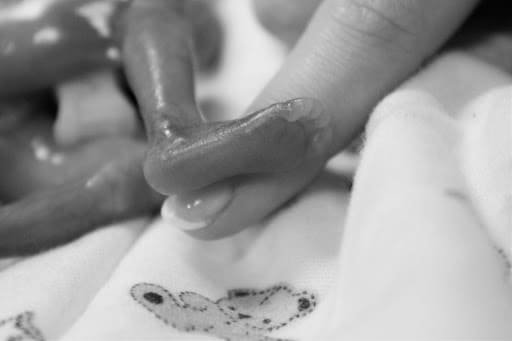
“I had a miscarriage and lost my baby. Will this happen again?”
This is what a patient asked her doctor on her first visit when she got
pregnant after miscarriage for a second time.
Miscarriage is one of the most common fears of pregnant women, especially if it has happened before.
Women think it is because of a mistake they made or extra effort, but this is not the case.
What is defined as a miscarriage?
It is an event that occurs during pregnancy and causes fetal loss before the 20th week of pregnancy, usually within the first trimester.
Miscarriage causes
A pregnant woman’s activities or disregard for instructions and advice do not cause the loss of the fetus.
However, they can be one of the contributing factors if overdone.
Actually, the abnormal growth of the fetus is the major cause of miscarriage.
There are many reasons for abnormal fetal growth, such as:
Genetic causes
The mother and the father contribute equal sets of chromosomes (23 chromosomes each) to the fetus.
Sometimes these chromosomes contain some abnormalities and can cause the following:
Intrauterine fetal demise
The fetus is formed, but does not grow and dies before the pregnant woman notices that she is pregnant sometimes.
A Blighted ovum
The sperm fertilizes the egg, but no embryo is formed.
Molar pregnancy
The fetus has no maternal chromosomes and gets all his 46 chromosomes from the father.
Partial molar pregnancy
The mother contributes her share of chromosomes, but the father also contributes twice his share of chromosomes.
Placenta
The placenta is the organ responsible for the delivery of blood, food, and oxygen to the fetus.
Any problem in the placenta’s development affects the fetus and causes its loss.
Habits and lifestyles
Certain lifestyles and habits can cause the loss of the fetus, such as:
- Malnutrition.
- Improper use of medication.
- Old age.
- Hormonal problems.
- Traumas.
- Obesity.
- Cervix conditions and muscle weakness.
- Some medications.
- Uterine abnormalities.
- Uterine fibroids.
Chronic diseases
These diseases cause fetal loss in the fourth to sixth months, especially if not treated or controlled.
For example:
- Uncontrolled diabetes mellitus.
- High blood pressure.
- Kidney disease.
- Hyperthyroidism.
- Lupus.
- Hypothyroidism.
Infection
Certain infections increase the risk of fetal loss, such as:
- German measles (Rubella).
- Gonorrhea.
- Malaria
- Syphilis.
- Chlamydiosis
- AIDS (HIV).
Food poisoning
Pregnant women should avoid foods of unknown origin for fear of food poisoning that affects the pregnancy and can cause fetal loss.Common Microbes that cause food poisoning include:
Listeria
It is found in unpasteurized dairy products, such as blue cheese.
Toxoplasmosis
Toxoplasmosis is transmitted to a pregnant woman by eating undercooked meat.
Salmonella
Undercooked eggs cause this type of food poisoning.
Pharmaceutical products
Pregnant women should consult their doctor before taking any medications.
Some medications can increase the risk of fetal loss, for example;
- Misoprostol and Methotrexate: For Rheumatoid Arthritis.
- Retinoids: For treating acne and eczema.
- Non-steroidal anti-inflammatory drugs: For relieving pain and treating infections, such as ibuprofen.
Polycystic ovary syndrome (PCOS)
It is a condition in which the ovaries are too large because of hormonal changes in the ovaries.
Some studies suggest that this syndrome increases the risk of fetal loss in women
What increases miscarriage risk?
Risk is increased by certain factors, such as:
- Exposure to harmful chemicals or radiation.
- Excess consumption of caffeine.
- Smoking.
- Obesity.
- Uterine or cervical problems.
- Severe body injury.
- Recurrent fetal loss.
- Chronic diseases such as diabetes.
- Fetal fluid test. (amniocentesis)
Miscarriage early symptoms
Symptoms vary according to the stage of pregnancy and its progress.
It sometimes happens even before the pregnant woman is aware of her pregnancy.
Symptoms include:
- Vaginal bleeding.
- Vaginal secretions (miscarriage discharge).
- Severe contractions.
- Back pain, whether acute or mild.
- Excessive spotting.
Repeated miscarriage
A woman should wait a while before trying to conceive again.
Miscarriage is rarely recurrent.
However, if it happens again, it is preferable to run the following tests.
- A blood test to check for hormones.
- Examination of the pelvis and uterus.
- Chromosome analysis.
- Ultrasound.
Repeated miscarriage causes
It is recurrent if it occurs two or more times.
One research shows that its recurrence occurs for unknown reasons in 60% of cases.
Other cases occur mainly due to genetic and thyroid problems.
Misconceptions about miscarriage
Some people believe that the following situations contribute to an increased risk of fetal loss, but this is not true, for example;
- The emotional state of the pregnant woman during pregnancy, as stress or depression.
- Exercise during pregnancy.
- Work during pregnancy, especially one that involves standing or sitting for a long time.
- Have sex during pregnancy.
- Travel by air, but you must consult a doctor before that.
- Hot food.
Types of miscarriage
The doctor determines the type by examining the pregnant woman.
There are several types, and here we list the following:
Complete miscarriage
All pregnancy tissue is expelled from the body.
Incomplete miscarriage
Some of the pregnancy tissue is expelled.
Missed or silent miscarriage
It occurs when a fetus or embryo dies but no bleeding or loss of fetal tissue occurs.
The mother may continue to experience pregnancy symptoms.
Threatened miscarriage
The pregnant woman at risk of losing her fetus has constant cramping and bleeding.
Inevitable miscarriage
Cramping and bleeding continue, and the cervix dilates as a sign of its occurrence.
Septic miscarriage
The pregnant woman has a uterine infection and symptoms such as high fever, shivering, and vaginal discharge with a distinct foul odor.
How can I prevent a miscarriage?

Some tips and instructions for prevention include:
- Visit your gynecologist periodically throughout your pregnancy.
- Avoid smoking or using medications without consulting your doctor.
- Keep a healthy weight both before and during pregnancy.
- Avoid infection or contact with people, and wash your hands regularly.
- Minimize your daily caffeine intake.
- Stick to pregnancy vitamins.
- Follow a healthy diet.
Miscarriage in twin pregnancy
Miscarriage chances in twin pregnancy are high because the mother may lose one or both fetuses.
Sometimes the so-called vanishing twin syndrome occurs.
At the beginning of the pregnancy, the mother learns she is carrying twins, triplets, or more.
However, later in the pregnancy, one of the embryos or fetuses may no longer be detectable.
Usually, the vanishing fetus is absorbed into the placenta.
Period vs miscarriage
A pregnant woman may lose the fetus before realizing it is there, and she may believe she is experiencing PMS symptoms, but they differ in some respects.
Miscarriage symptoms last longer than the menstrual cycle, such as bleeding, severe cramps, and secretion of blood clots or fluids.
Miscarriage chances
Chances vary, but research shows that it usually occurs during the first three months of pregnancy, and its rate decreases with the progression of pregnancy.
It appears in 10% of the cases.
Miscarriage also occurs in the first month at a rate of 3 out of 4 pregnancies, and its incidence increases with age.
Treatment of miscarriage
Treatment depends on its type.
If the pregnant woman has lost the entire fetus and all tissues, she does not require treatment.
But if some tissues remain inside the body, the following treatments may be needed:
Expectant treatment
The pregnant woman is waiting to get rid of all the tissue naturally.
Medical therapy
Here, the pregnant woman uses some medications to help her get rid of the remaining pregnancy tissue.
Surgical treatment
The doctor performs surgery to remove the remaining tissue.
Home remedy after miscarriage
Women return to normal within a short period.
However, it varies according to pregnancy progress.
They may experience some cramping or slight bleeding.
Pregnancy hormones last a few weeks, and it is preferable to stop having sex for at least two weeks after losing the fetus.
How to recover after a miscarriage?
After losing the fetus, women suffer from a lack of sleep, the desire to cry, and the lack of energy because of fluctuating feelings.
Therefore, women need psychological support to face this difficult period and overcome it with no psychological accumulation.
The following tips may help:
- Seek help from others, especially family and friends.
- Hide everything related to the pregnancy or the baby until you get over what happened.
- Visit a psychiatrist when necessary.
- Talk to others who have had the same experience.
In conclusion, the pregnant woman should not worry about the risk of miscarriage, and go about her life normally.
However, she should take good care of her health and follow the doctor’s instructions.